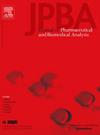Nanomaterial-based magnetic solid-phase extraction in pharmaceutical and biomedical analysis
IF 3.1
3区 医学
Q2 CHEMISTRY, ANALYTICAL
Journal of pharmaceutical and biomedical analysis
Pub Date : 2024-10-28
DOI:10.1016/j.jpba.2024.116543
引用次数: 0
Abstract
Magnetic solid-phase extraction (MSPE) holds significant scientific and technological interest as a novel sample preparation method for complex samples due to its easy operation, swift separation, high adsorption efficiency, and environmental friendliness. As the core of MSPE, magnetic sorbents have captured tremendous attention in recent years. Various promising nanomaterials, such as metal-organic frameworks and covalent organic frameworks, have been synthesized and utilized as sorbents in pharmaceutical and biomedical analysis. This review intends to (1) summarize recent progress of magnetic sorbents applied in this area and discuss their advantages, disadvantages, possible interaction mechanisms with the target substances; (2) explore their innovative applications in the analysis of pharmaceuticals, proteins, peptides, nucleic acids, nucleosides, metabolites, and other disease biomarkers from 2021 to 2024; (3) present the integration of MSPE with emerging analytical technologies; and (4) discuss the current challenges and future perspectives. It is expected to provide references and insights for the development of novel magnetic sorbents and their applications in bioanalysis.
基于纳米材料的磁性固相萃取在制药和生物医学分析中的应用
磁性固相萃取(MSPE)作为一种新型的复杂样品制备方法,以其操作简便、分离迅速、吸附效率高和环境友好等优点,在科学和技术领域备受关注。作为 MSPE 的核心,磁性吸附剂近年来备受关注。各种有前景的纳米材料,如金属有机框架和共价有机框架,已被合成并用作药物和生物医学分析中的吸附剂。本综述旨在:(1) 总结应用于该领域的磁性吸附剂的最新进展,讨论其优缺点以及与目标物质可能的相互作用机制;(2) 探讨 2021 年至 2024 年其在药物、蛋白质、肽、核酸、核苷、代谢物和其他疾病生物标记物分析中的创新应用;(3) 介绍 MSPE 与新兴分析技术的整合;以及 (4) 讨论当前挑战和未来展望。希望能为新型磁性吸附剂的开发及其在生物分析中的应用提供参考和启示。
本文章由计算机程序翻译,如有差异,请以英文原文为准。
求助全文
约1分钟内获得全文
求助全文
来源期刊
CiteScore
6.70
自引率
5.90%
发文量
588
审稿时长
37 days
期刊介绍:
This journal is an international medium directed towards the needs of academic, clinical, government and industrial analysis by publishing original research reports and critical reviews on pharmaceutical and biomedical analysis. It covers the interdisciplinary aspects of analysis in the pharmaceutical, biomedical and clinical sciences, including developments in analytical methodology, instrumentation, computation and interpretation. Submissions on novel applications focusing on drug purity and stability studies, pharmacokinetics, therapeutic monitoring, metabolic profiling; drug-related aspects of analytical biochemistry and forensic toxicology; quality assurance in the pharmaceutical industry are also welcome.
Studies from areas of well established and poorly selective methods, such as UV-VIS spectrophotometry (including derivative and multi-wavelength measurements), basic electroanalytical (potentiometric, polarographic and voltammetric) methods, fluorimetry, flow-injection analysis, etc. are accepted for publication in exceptional cases only, if a unique and substantial advantage over presently known systems is demonstrated. The same applies to the assay of simple drug formulations by any kind of methods and the determination of drugs in biological samples based merely on spiked samples. Drug purity/stability studies should contain information on the structure elucidation of the impurities/degradants.

 求助内容:
求助内容: 应助结果提醒方式:
应助结果提醒方式:


